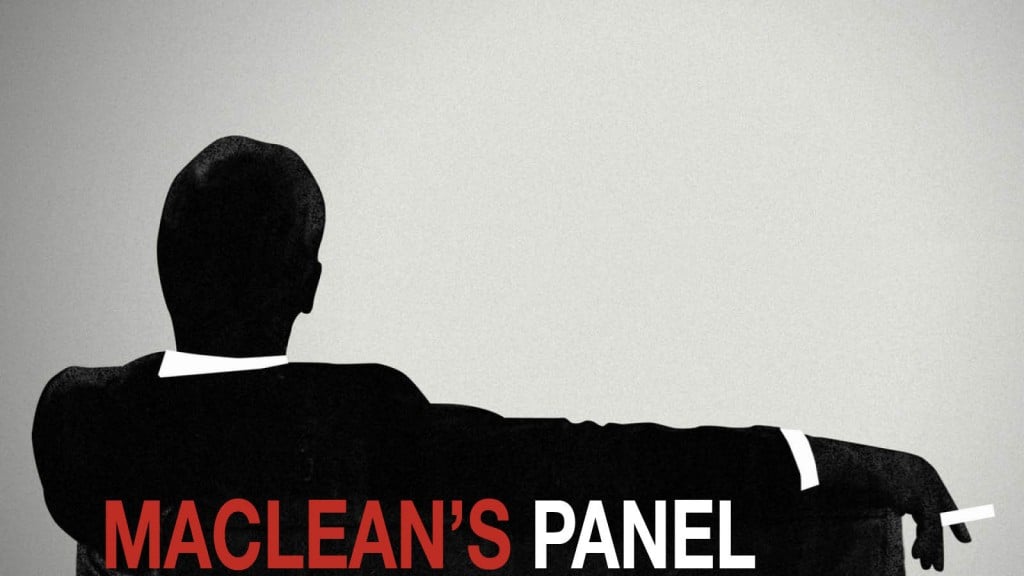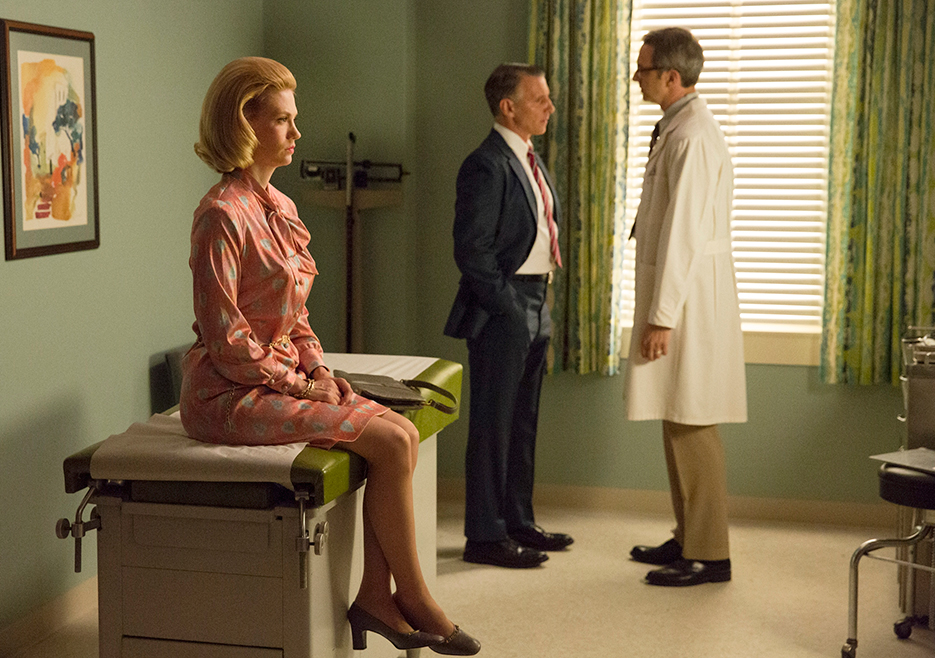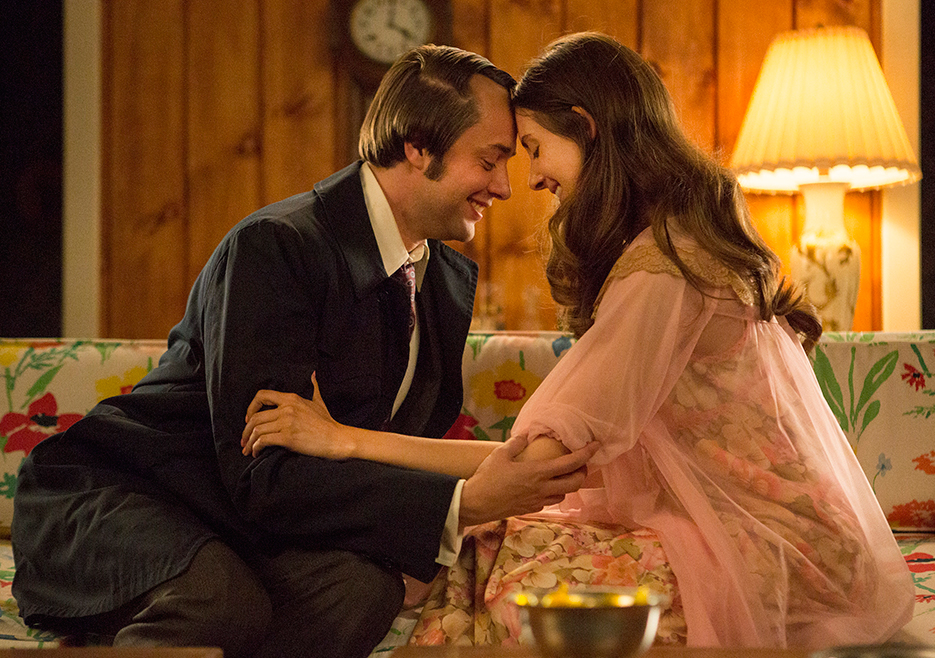Maclean’s Mad Men panel: A dark Mother’s Day
A recap of the second-last episode of Mad Men, and analysis of one big moment: a surprise happy ending, in the wake of a tragic one
Share
 After seven seasons, it ends on May 17: Mad Men, that sartorially splendid, slow-burning show from AMC, will wind down its clock. What will become of the lusty, booze-swilling ad man, Don Draper? Every week, Adrian Lee, Colin Horgan and Sonya Bell quickly recap what stood out most from each of the final episodes and, in true Mad Men fan form, find one detail to obsess over, analyzing its many prisms, as the episode’s Mad Moment. Be forewarned: There are spoilers ahead, for those who have not seen the latest episode. You can read last week’s panel here.
After seven seasons, it ends on May 17: Mad Men, that sartorially splendid, slow-burning show from AMC, will wind down its clock. What will become of the lusty, booze-swilling ad man, Don Draper? Every week, Adrian Lee, Colin Horgan and Sonya Bell quickly recap what stood out most from each of the final episodes and, in true Mad Men fan form, find one detail to obsess over, analyzing its many prisms, as the episode’s Mad Moment. Be forewarned: There are spoilers ahead, for those who have not seen the latest episode. You can read last week’s panel here.
THE ROUNDTABLE
ADRIAN LEE: This last season of Mad Men has been a reminder that this is a series that relishes the lifelike way that even the most minor actions will have future repercussions, even if it’s not in the same month or the same year. The kerplunks of stones from episodes past are trembling, rippling across this final season’s pond. Most consequences have been subtle. But the biggest rocks get the biggest waves.
Well, the revelation in this episode that Betty has terminal lung cancer—she gets nine months to live—is a tidal wave. The boulder? Don’s own career, spent, in part, convincing Americans that cigarettes were harmless fun sticks. (The show’s very first scene finds Don trying to sell cigarettes to a waiter.)
First, a mea culpa: Many viewers, including me, have wondered whether Betty’s chilly demeanour is either deeply understated or horribly mawkish acting on the part of January Jones. But tonight’s episode proved she’s really a fine actor. The lost look on her face as her husband and a doctor discuss the cancer in her own body, the firmness of her stance that she will refuse treatment, the line, “I’ve fought for a lot in my life. That’s how I know it’s over”: That was the same Betty Draper we’d seen all series, but in an utterly different way.
There have never been such doubts of Kiernan Shipka, who put on a gut-wrenching performance as Sally, the daughter who has been thrust into adulthood too soon. At the episode’s beginning, she’s being admonished for little things, such as money and field hockey equipment. In the middle, she holds her hands to her ears, trying to reject the news that Henry brings. At the episode’s end, she’s handling her soon-to-be-dead mother’s affairs. A few episodes ago, Don scolded Sally, saying she was her parents, whether she liked it or not. The way she came to the kitchen table and lied sweetly to her brothers about her reason for coming home—trouble at school, not cancer—proved how sadly wrong Don was. Actions have consequences. The breaking of the ice queen leads to a tearful, beautiful, perfect kind of goodbye. Happy Mother’s Day, indeed.
Then there’s Don, who meets a kid in an Oklahoma motel who steals money and blames him; curiously, he takes the kid under his wing and gifts him his car. But, before that, inexplicably, Don agrees to go to a legion hall; for a man with secrets like his, that’s like a mouse waltzing willingly into a party of cats. Why would he do it? He winds up revealing, drunkenly, that he killed his commanding officer and was sent home: the action that launched so many ripples, the crisis that made him leave Dick Whitman behind and become Don Draper. That action has had consequences throughout the series. And yet, when it tumbles out of his mouth, the other veterans simply nod. What will be the ultimate consequence of the fact that he’s told it to a lion’s den?
How does it all end? Well, it’s a Buddy Holly song that plays out this episode, a man who famously died in a plane crash. I’m more confident than ever that Mad Men doesn’t end with the D.B. Cooper theory so many are surmising: that Don is not the mystery man who leapt out of a plane in 1971 (more on that when you see an interesting interview come Tuesday on macleans.ca). But that’s notable, for sure.
Colin, what did you take away from this episode?

COLIN HORGAN: The best things in life are free. Like someone fixing your typewriter when you didn’t expect it. Like a good book. Like telling the truth. Like owning up. Like love. Like a Cadillac.
Where are we, here? Is this an ending? For some, perhaps. For Betty, certainly—and sadly—it seems that way. For Sally, this is a weird kind of beginning. Finally, someone on this show vocalized (sort of) what we’ve all known for years now: that Sally Draper is going to be one very interesting woman. That it was finally Betty who told her so was a nice surprise, though, again, the circumstances were a bit bleak. Elsewhere, Duck Phillips is running around like a wealthy Willy Loman, trying to cook up some scheme with Pete (more on that below). I’m not sure whether that’s a beginning or an ending for Duck, though I suppose it might depend on the venture’s success (as it did for Loman, too).
And Don? An ending? A fresh start? Or history repeating? One might wonder whether, with Don, there’s ever any difference. As far as consequences go, I’ve always been struck by how few there have been for Don when he tells his true story. It’s like a huge fake-out. We’re all led to believe his dark past will ruin him when it was brought to light. And true, it helped to destroy his marriage—but the emphasis is on “helped.” There were plenty of other reasons.
Perhaps instead, then, the question ought not to be one of beginnings and endings—or even consequences—but, rather, of accomplishment. The idea of achievement has perhaps been Mad Men’s strongest narrative driver, present equally in the characters and the world they inhabit.
What does achievement really look like? Does it look like a new office on the 19th floor? Does it look like $2 million (or maybe only $500,000)? Does it look like a spaceship on the moon? Or is it only what the ads tell us it is? Don isn’t just a man bent on achievement; he wants it for you, too. He wants it for that kid who tried to rip him off. He wants it because he got it, in some form. Don is an ad guy, a manufacturer of manufactured success. Don fabricates easily attainable achievement every day. All you have to do is buy it.
But if you don’t buy anything, if you take what’s free . . . hmmm . . . Is there a slogan for that?
SONYA BELL: As a big Betty fan, this was a devastating episode. Even my all-time favourite Betty scene—from the first season, when she grabs a rifle and shoots her neighbour’s pigeons out of the sky—is now tainted: Dangling from her mouth is a cigarette. How will Don react when he finds out she’s dying? Will he take custody of the kids, or will they stay with their step-dad, Henry Francis? Those answers might help shape Don’s ending in next week’s episode.
There was a brief scene at the motel I enjoyed, when Don heads to the pool and sees a beautiful woman sunning herself. He looks her up and down; she doesn’t notice. Then a family joins her, and he dives in, and it’s over. What I thought was going to be yet another Don-as-Casanova moment amounted to nothing.
As for what achievement looks like, Colin, maybe it’s Don sitting at a dusty Midwestern bus stop with a single Sears bag, somehow content. That could only be the case if you had other options, at some point. Now Don is using the past tense—”I was in the advertising business”—and just wants to see the Grand Canyon.

THE MAD MOMENT
Every week in this segment, our Mad Men experts find one particularly fascinating moment to analyze deeply, reading into it for its clues and its contexts. This week’s Mad Moment: After telling Trudy that he’s going to take a job in Wichita with private-jet access, Pete tells Trudy that she and their daughter will join them, that he’s only ever loved her. It’s perhaps the show’s finest pitch of all: ‘”Say yes with your voice, not just your eyes.” She does. They kiss deeply.
ADRIAN: What?! Happiness, on Mad Men? It’s an odd turn because Trudy has seemed so certain about her hatred; just last season, she told him that if he so much as urinated within 50 feet of the house, she would destroy him. But to see Pete here in this episode is to see a man fundamentally changed. You see it in the contrast between him and his brother at a dinner while discussing work and women, where Pete notes sagely that he thinks womanizing feels good “and then it doesn’t.”
Actions, meet consequences: Pete’s become a man, in a way that he’s spent the entire series striving to become, often flailing. He’s always been a mousy, conniving figure, but he is embedded deeply in a world of unbridled traditional masculinity, and that’s been his major conflict. (Recall, if you will, the first-season episode where he’s emasculated in a department store and winds up buying a rifle and waving it around the office; recall, too, the time he lost a fistfight to Lane Pryce.) He lost it all, truly, before the string of infidelities that lost him Trudy the first time around—he lost it when Peggy, the girl he slept with and impregnated, told him that she gave up his child for adoption. But this season, he’s a man on both those traditional terms—beating up headmasters holding pathetic grudges, and confident in his work life — and his own, from administering toothpaste balms to his daughter’s bee stings, to saying all the right things to win back the love of his life.
Perhaps this is the happy ending because it’s a portent that no one else will get one, with just one episode left of this gorgeous show. If so, at least we have this: the redemption of a man who began the season as its villain, the man who held a secret over Don and held a rifle to the head of Peggy, the girl he knocks up, gets to leave with everything he’s ever wanted, no doubt a better man. Life doesn’t only take, as it did for Betty. More often than not, it lets you grow into who you’re supposed to be.
COLIN: If anyone dies by jumping from a plane, or being pushed from a window, it now seems to me it might be Pete (although perhaps we’re too late for either now). I actually thought for a moment when Duck turned up drunk to Pete’s hotel room, that it would happen there.
I’m not so convinced that Pete has actually learned much, but maybe that doesn’t mean anything other than I’m a cynic. Still, his pitch to Trudy is a weird one. “We both know things can’t be undone,” Trudy tells him.
“Says who?” Pete asks. “We’re not even through half our lives. And even if we are, we’re entitled to more.”
“Of what?” Trudy asks.
Pete pauses briefly. “Then we’re entitled to something new,” he says. “I want to start over. I know I can. I’m not so dumb anymore.”
Is that a believable pitch? Is it true? It’s certainly better than the one he gave her earlier at the kitchen table, when he asks Trudy to join him at dinner with Duck and the Learjet executive. “How about for old time’s sake?” Pete offers her after she first refuses. “I’m jealous of your ability to be sentimental about the past,” Trudy replies. “I remember things as they were.” They have a word for that kind of sentimentality: nostalgia.
So, more effective though Pete’s second pitch is, I’m not sold. But I might just be cynical. It’s possible that, having been reminded at a few points this year of the children he gave up – not to mention the wife – Pete came to ground, and decided to return home. Sonya, is it really plausible that Pete has finally become self-aware?
I’m not so sure. To me, this part of their conversation suggested to me something else, and leads me to believe it’s a hollow reconciliation. This exchange happens to be a nice summation of the idea of advertising, generally. Advertising implants in you the idea that you’re entitled to something new. But when you get it, you’re not really achieving anything, but rather merely consuming. As I said above, Don is the most prominent example – the consumer of all, including other people (read: women). Pete is a few steps behind, but is gaining ground fast.
Maybe nothing will happen to Pete. Maybe he won’t jump from a plane. Maybe nobody will. Maybe that’s not what all these planes are there for. Maybe, instead, they’re just to remind us of their promise: flight, to something else, to something new. That is, as long as we can afford the ticket.
SONYA: What a pitch: “I’m not so dumb anymore.” It could only work at 4 a.m. Still, I couldn’t help but be happy that Pete and Trudy are getting a second chance. It seemed out of the blue, but I think that’s partly because Pete’s storyline never took him to suburbs. Apparently he has been visiting, taking their daughter out twice a week now that he’s back in New York. (Even though, as far as I can remember, that was our first sighting of Tammy.) The fact that neither Pete nor Trudy ever met anyone else of any importance leads me to believe this reconciliation was always in the back of Matthew Weiner’s mind.
Colin, you asked if Pete has really become self-aware. I think he has—in so far as he’s realized that he has the same flaws as his father, and that they are flaws. But I’m not yet convinced he’ll be able to do anything about them.
So as for how sincere the whole reunion is….I too have doubts. The very fact Pete is leaving McCann-Erickson for a new job shows he’s still on the hunt for more. Pete had serious FOMO before the phrase was coined. Also, he promised Trudy that Wichita was beautiful and wholesome. I haven’t been, but I suspect only one of those things is true.